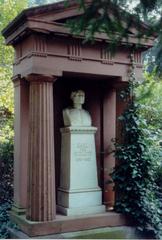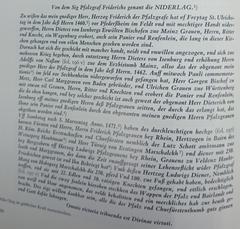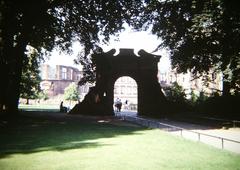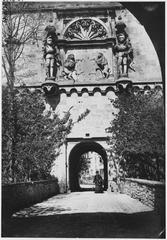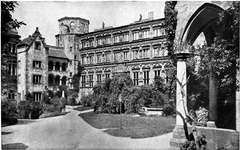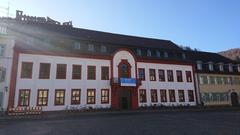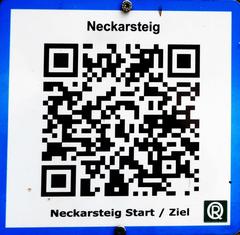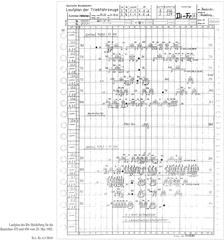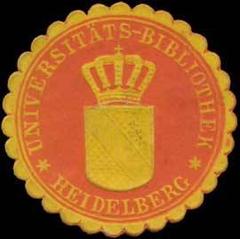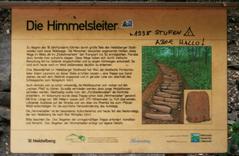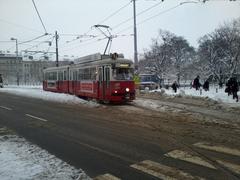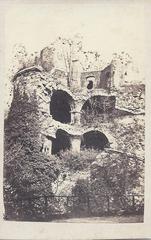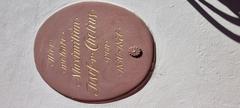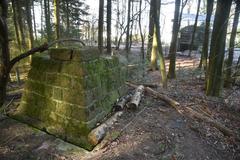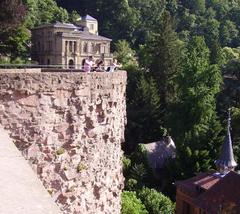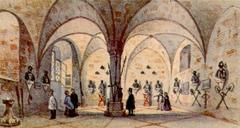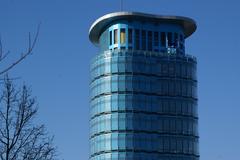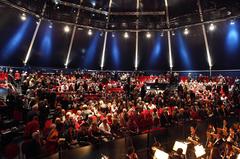University Hospital Heidelberg Visiting Hours, Tickets, and Guide to Heidelberg Historical Sites
Date: 14/06/2025
Introduction
Heidelberg University Hospital stands as both a pioneering medical institution and an integral part of Germany’s cultural and scientific heritage. Established in the 14th century alongside Heidelberg University—Germany’s oldest university—the hospital has evolved into one of Europe’s leading centers for clinical care, research, and education (Heidelberg University Hospital Overview; Qunomedical).
This guide provides comprehensive information for patients, families, medical professionals, and tourists. It covers essential details such as visiting hours, campus navigation, accessibility, ticketing for special exhibitions, and tips for exploring nearby historical sites like Heidelberg Castle and the Philosophenweg (Heidelberg University Museums and Collections). Whether you are visiting for healthcare, academic collaboration, or cultural enrichment, this resource ensures a smooth and rewarding experience.
Contents
- History and Development of Heidelberg University Hospital
- Modern Medical Achievements
- Visitor Information: Hours, Tickets, and Accessibility
- Campus Layout and Key Departments
- Facilities and Services
- Getting There and Transportation
- Exploring Heidelberg: Castles, Museums, and More
- Frequently Asked Questions (FAQ)
- Resources and Official Links
1. History and Development of Heidelberg University Hospital
Founded in 1386, Heidelberg University Hospital has played a pivotal role in the advancement of medicine in Germany and beyond. The hospital’s early history is marked by the integration of clinical care with academic research and teaching, a tradition that continues today (Heidelberg University Hospital Overview; Qunomedical).
Throughout the centuries, the hospital has expanded its facilities and scope. Notably, in the late 19th century, surgeon Vincent Czerny established a research center for combining surgical and radiation therapies—an innovation that set the stage for Heidelberg’s leadership in oncology (Heidelberg Ion Beam Therapy Center History).
Today, Heidelberg University Hospital comprises 44 specialized departments and 13 medical institutes, employs over 10,400 staff, and treats more than one million patients annually (MediGlobus; Qunomedical).
2. Modern Medical Achievements
Oncology and the Heidelberg Ion Beam Therapy Center (HIT)
Heidelberg is internationally renowned for its pioneering cancer treatments. The Heidelberg Ion Beam Therapy Center (HIT), opened in 2009, was Europe’s first facility to offer both proton and heavy ion therapy using advanced particle accelerators (Heidelberg Ion Beam Therapy Center History). The center treats tumors with millimeter precision, improving patient outcomes for previously inoperable cancers.
Transplantation and Surgical Excellence
Heidelberg University Hospital is a national leader in organ transplantation, with outstanding survival rates—97% for kidney and 93% for liver transplants (MediGlobus; Qunomedical). The hospital was also among the first in Germany to perform autologous stem cell transplants.
Neurology, Neurosurgery, and Rehabilitation
The neurology and neurosurgery departments are among the most advanced in Europe, handling over 12,000 patients and performing 3,500 surgeries annually. They utilize state-of-the-art technologies such as digital operating room systems and 3D surgical planning (MediGlobus).
3. Visitor Information: Hours, Tickets, and Accessibility
Visiting Hours
- Standard Visiting Hours: 2:00 PM – 8:00 PM daily.
- Note: Hours may vary by department and are subject to change due to health protocols. Always confirm with the hospital or the specific department before your visit (Heidelberg University Hospital – Directions & Parking).
Tickets and Tours
- General Admission: Free for patients, visitors, and staff.
- Guided Tours and Exhibitions: Some special exhibitions (e.g., the historic medical instruments collection) or guided tours require tickets, which can be booked online or at the visitor center.
- Virtual Resources: Online tours and multimedia content are available for remote exploration.
Accessibility
- Mobility: Wheelchair-accessible entrances, elevators, and restrooms are available.
- Support Services: Assistance can be arranged in advance for visitors with disabilities (Heidelberg University Guesthouses).
4. Campus Layout and Key Departments
Main Campuses and Locations
- Neuenheimer Feld: Central campus for most clinics and research institutes.
- Bergheim: Centre for Psychosocial Medicine.
- Schlierbach: Orthopaedic and Spinal Cord Injury Clinics.
- Rohrbach: Thoraxklinik for lung and thoracic diseases.
- Heppenheim: Bergstrasse District Hospital.
Clear signage, maps, and a car park guidance system facilitate navigation (Heidelberg University Hospital – Parking; Heidelberg University Maps).
Key Departments
- General, visceral, transplant, cardiac, and vascular surgery
- Oncology and cancer treatment, including HIT
- Neurology, neurosurgery, and psychiatry
- Pediatrics, gynecology, and dermatology
- Orthopaedics and trauma care
- Palliative and psychosocial care (Medical Tourism Review)
5. Facilities and Services
- Patient Rooms: Options include comfort rooms and specialized family accommodations.
- Support Services: Multilingual information desks, advocacy, and clinical trial support.
- Dining: Cafeterias and snack bars are available throughout the campus.
- ATMs: Multiple cash machines in Neuenheimer Feld.
- Accommodation: Collaborations with local hotels and guesthouses, including accessible units (Heidelberg University Guesthouses).
- Digital Services: Advanced IT infrastructure for patient and visitor support.
6. Getting There and Transportation
Public Transport
- Trams/Buses: Direct connections from Heidelberg’s city center and main train station to Neuenheimer Feld.
By Car
- Parking: Extensive facilities with real-time availability updates.
- Fees: €3 for the first two hours, €1.70 for each additional hour, with a daily max of €10. Special car parks (e.g., Mathematikon, P15) have separate rates (Heidelberg University Hospital – Parking).
- Sustainability: Parking revenue supports hospital operations and public transport subsidies.
Campus Navigation
- Signage and Maps: Clear directions and digital tools assist visitors in locating departments (Heidelberg University Hospital – Directions & Parking).
- Accessibility: Ramps, elevators, and accessible restrooms are standard.
Visitor Tips
- Language Support: Multilingual staff and materials (Heidelberg Health).
- COVID-19: Always check for the latest health and safety guidelines.
- Accommodation: Book early, especially during university semesters (Heidelberg University Guesthouses).
- Registration: Longer stays (over three months) require local residence registration.
7. Exploring Heidelberg: Castles, Museums, and More
Heidelberg Castle
- Opening Hours: 9:00 AM – 6:00 PM daily (seasonal variations possible).
- Tickets: €8 for adults; reduced rates for students, seniors, and children. Tickets available onsite or online (Heidelberg Castle Official Website).
- Guided Tours: Available in several languages and recommended for deeper historical insight.
- Access: Reach the castle by funicular, shuttle, or hiking from the Old Town.
- Highlights: The Heidelberg Tun wine barrel, castle gardens, and breathtaking views over the city and Neckar River.
Other Attractions
- Philosophenweg (Philosophers’ Walk): Scenic city views.
- Old Bridge (Alte Brücke): Iconic 18th-century bridge.
- University Museums and Collections: Featuring historic medical instruments and art (Heidelberg University Museums and Collections).
- Zoo & Botanical Garden: Suitable for families.
- Old Town (Altstadt): Cobblestone streets, cafes, and shops.
8. Frequently Asked Questions (FAQ)
Q: What are the current visiting hours at Heidelberg University Hospital?
A: Generally 2:00 PM – 8:00 PM daily, but check with your specific department or the hospital website for updates.
Q: Is there a ticket required for general hospital visits?
A: No, but special exhibitions or guided tours may require tickets.
Q: Are there accessible facilities for visitors with disabilities?
A: Yes, accessible entrances, restrooms, and support services are provided.
Q: How do I get to the hospital by public transport?
A: Trams and buses connect the main campus (Neuenheimer Feld) to central Heidelberg and the main train station.
Q: What are the parking fees?
A: €3 for the first two hours, €1.70 for each additional hour, up to €10 daily.
Q: What are the best nearby attractions?
A: Heidelberg Castle, Philosophers’ Walk, Old Bridge, and university museums.
9. Resources and Official Links
- Heidelberg University Hospital Overview
- University Hospital Heidelberg, Qunomedical
- Heidelberg Ion Beam Therapy Center History
- Heidelberg Clinic, MediGlobus
- Heidelberg University Hospital – Directions & Parking
- Heidelberg University Museums and Collections
- Medical Tourism Review: Heidelberg University Hospital
- Heidelberg Castle Official Website
- Heidelberg University Guesthouses
- Heidelberg Tourism Portal
- Mapcarta: Heidelberg University Hospital
For more insights, download the Audiala app for real-time navigation and audio guides, and follow Heidelberg University Hospital and city tourism channels on social media for updates and special events.
